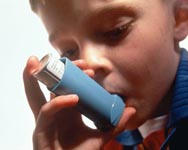Farm kids have lower asthma risk as compared to city kids

Washington, Oct 17 : Children living in farms have lower risk of asthma as compared to their urban counterparts or those living in non-agricultural rural environment, says a study.
The University of Alberta study, led by William Midodzi, a PhD candidate in the Department of Public Health Sciences in the University of Alberta School of Public Health in Edmonton, Canada was based on two surveys, which involved 13,524 asthma–free children aged less than 12 years.
The analysis of the survey revealed that farm children were at a lower risk of developing asthma than their counterparts who resided in either non-farming rural environments, such as residential acreages and rural towns, or an urban environment.
The two-year cumulative incidence of asthma was only 2.3 per cent in farm children, compared to 5.3 per cent for other rural and 5.7 per cent for urban children.
“Farm children of ages one to five years also showed a stronger protective effect against asthma than those aged six to 11 years, possibly due to earlier exposure to the farm environment,” Midodzi said.
It was also found that youngsters with parental history of asthma living in farming environments had a reduced risk of asthma compared to children living in rural non-farm environments.
While children with parental history of asthma living in urban areas had a higher risk when compared with children living in rural non-farm environments.
Midodzi said that the reason behind the reduced risk for the development of asthma besides avoidance of urban environment early in life could be exposure to compounds called ‘endotoxins’, which comes from animal viruses, and manure.
The study shows that living in a farming environment reduces the risk of developing asthma, dismissing earlier studies reporting that existing asthma was related to exposure to farming environments.
The researchers believe that exposure to endotoxins stimulates the body’s immune system and keeps it busy fighting bacteria thus reducing the risk of the body turning its immune attention to lung inflammation that causes asthma.
Co-author of the study Carina Majaesic, paediatric at the University of Alberta said that the finding might help clinicians treat patients with asthma to identify high-risk children and also educate parents.
“This research suggests that we should discourage childhood exposure to tobacco smoke, encourage breast feeding, and not worry about keeping children’s environment too sterile,” Majaesic said.
The study was published in the journal Respirology. (ANI)